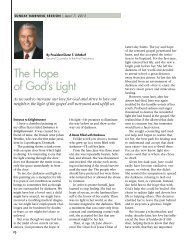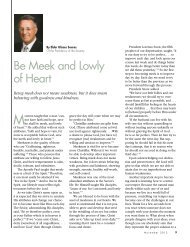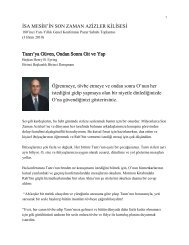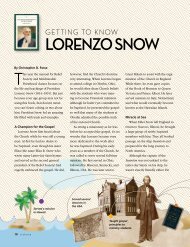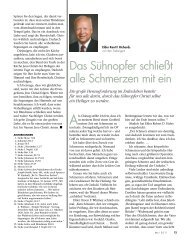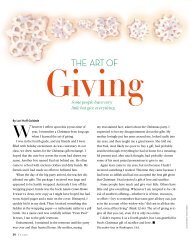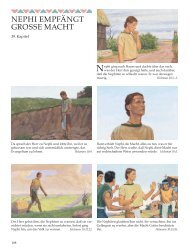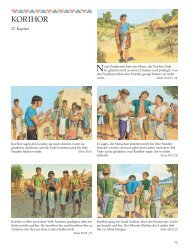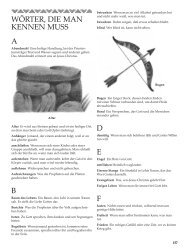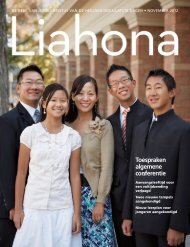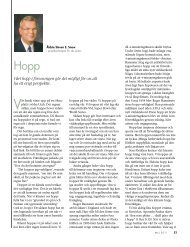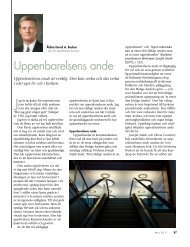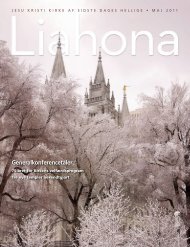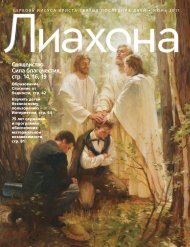April 2005 Ensign - The Church of Jesus Christ of Latter-day Saints
April 2005 Ensign - The Church of Jesus Christ of Latter-day Saints
April 2005 Ensign - The Church of Jesus Christ of Latter-day Saints
Create successful ePaper yourself
Turn your PDF publications into a flip-book with our unique Google optimized e-Paper software.
get things done,” she recalls. “I think I found<br />
at that moment that blindness wasn’t the<br />
issue but that as members <strong>of</strong> the <strong>Church</strong> we<br />
need each other.”<br />
Some people with partial or total vision<br />
loss may try to hide their blindness, not<br />
wanting to be thought <strong>of</strong> as different from<br />
or less capable than others. Several members<br />
<strong>of</strong> the Ruston group say that finally<br />
acknowledging their blindness was liberating,<br />
allowing them to move toward adapting<br />
to their own challenges in life.<br />
Unlike the other blind members in the<br />
ward, Sister Jakeman was not born blind. She<br />
lost her sight over time, the last <strong>of</strong> it fading<br />
away not long before she married her husband.<br />
<strong>The</strong> experience was very difficult; for<br />
a time, she harbored much anger. She recalls<br />
seeing the <strong>Church</strong> film <strong>The</strong> Testaments: Of<br />
One Fold and One Shepherd before her<br />
vision was gone and being angry at the final<br />
scene, in which the Savior heals a blind man.<br />
She had long prayed for such a healing in her<br />
own life, and it did not come. But Sister<br />
Jakeman says she has since learned to reconcile<br />
her feelings with the gospel and to experience<br />
the Savior’s love in her life. “<strong>The</strong> Spirit<br />
sees our inner hearts. As an individual I have<br />
started to realize that everyone needs <strong>Christ</strong>.<br />
In our society, we put way too much emphasis<br />
on physical perfection.”<br />
Sister Sexton points out that the confidence<br />
she feels in being able to function in<br />
life comes not from any particular kind <strong>of</strong><br />
training or from her own intelligence but<br />
from her faith in <strong>Jesus</strong> <strong>Christ</strong> and His<br />
Atonement. It is comforting to know that<br />
when she accepts a calling given by inspiration,<br />
the Holy Ghost will help her magnify<br />
it if she prepares properly.<br />
Jeff Pearcy says, “I would like people to<br />
observe what blind members can do and<br />
trust their abilities rather than automatically<br />
looking for a deficit.”<br />
Bishop Anderson learned quickly to<br />
overlook any possible<br />
deficit and see these<br />
members <strong>of</strong> his ward<br />
as great assets. “<strong>The</strong>y<br />
have testimonies <strong>of</strong> the<br />
gospel,” he says. “<strong>The</strong>y<br />
are well educated. <strong>The</strong>y<br />
have all the needed<br />
skills. All the qualities<br />
that are needed in a<br />
good teacher and leader<br />
are there.” <strong>The</strong> only<br />
help they may require is<br />
with transportation.<br />
Zena Pearcy says,<br />
“I’m so happy that the<br />
<strong>Church</strong> stresses over<br />
and over that we are<br />
all equally loved by<br />
Heavenly Father.”<br />
When leaders think<br />
in terms <strong>of</strong> finding<br />
opportunities for individuals<br />
to serve, she<br />
adds, no one has to<br />
miss out on the<br />
growth that comes<br />
with a calling. ■<br />
Here are some things we can do to<br />
help those who have lost their sight:<br />
As an Individual<br />
• Identify yourself when greeting<br />
someone who is blind.<br />
• Know the individual’s needs and<br />
abilities. She may not want assistance.<br />
But when not using a cane, she may<br />
appreciate your <strong>of</strong>fering an arm or an<br />
elbow to help.<br />
• Talk directly to the individual who<br />
is blind; do not ask questions through<br />
someone else.<br />
• Offer transportation.<br />
• Offer to read aloud visual aids or<br />
information written on the chalkboard.<br />
Jeff Pearcy (right) teaches student Phil<br />
Templet how to use a barbecue grill.<br />
HOW OTHERS CAN HELP<br />
As a Teacher or Leader<br />
• Remember, the blind cannot read<br />
printed agendas, bulletins, and classroom<br />
handouts. Offer to read aloud or<br />
record special materials for them.<br />
• Be sure that your members have<br />
access to materials for the blind listed<br />
in the <strong>Church</strong> Materials Catalog. <strong>The</strong>se<br />
materials are available in various formats<br />
(half- and standard-speed recordings,<br />
compact discs, braille) and<br />
in electronic form at www.lds.org. Be<br />
sure a braille hymnbook is available.<br />
• Preview videos used in teaching.<br />
Portions may need verbal description.<br />
• Arrange to accommodate a guide<br />
dog as necessary. Guide dogs must<br />
remain beside their masters.<br />
ENSIGN APRIL <strong>2005</strong> 53



